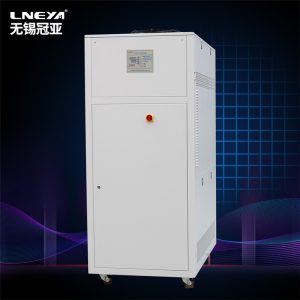self contained water chiller
Self-contained water chillers are designed to provide efficient and reliable cooling in a variety of industrial and commercial applications. These chillers are particularly useful in scenarios where space is limited or where the installation of additional cooling infrastructure, is not practical.

Features of Self-Contained Water Chillers:
All-in-One Design: These chillers house all components, including the condenser, within a single unit, eliminating the need for external cooling towers or extensive piping.
Ease of Installation: They can be installed quickly with minimal setup, often requiring only a water and power connection.
Portability: Many self-contained chillers are designed for easy movement, making them suitable for temporary or mobile cooling needs.
Energy Efficiency: Modern self-contained chillers use energy-efficient components and controls to minimize power consumption.
Benefits of Self-Contained Water Chillers:

Space Saving: The compact design allows for installation in tight spaces, making them ideal for facilities with limited room for additional equipment.
Cost-Effective: By reducing the need for extensive installation and infrastructure, self-contained chillers can offer a cost-effective cooling solution.
Versatility: They can be used in a wide range of applications, from laser cutting and plastic injection molding to medical and laboratory settings.
Applications of Self-Contained Water Chillers:

Industrial Processes: They are used to maintain optimal temperatures in processes such as chemical reactions, material testing, and product cooling.
Laser Technology: Self-contained chillers are essential for cooling lasers during cutting, engraving, and marking processes.
HVAC Systems: They can be integrated into heating, ventilation, and air conditioning systems to provide precise temperature control for indoor environments.
Maintenance and Operation:
Self-contained water chillers are designed for low maintenance, but regular checks are necessary to ensure optimal performance. This includes monitoring fluid levels, checking for leaks, and ensuring that the unit is clean and free of debris. Some chillers also offer advanced features such as remote monitoring and automated alerts for maintenance needs.
Conclusion:
Self-contained water chillers provide a convenient and efficient cooling solution for a variety of applications. Their all-in-one design, ease of installation, and energy efficiency make them an attractive option for industries that require precise temperature control. By understanding the features and benefits of these chillers, businesses can make informed decisions about their cooling needs and optimize their processes for improved efficiency and productivity.
Related recommendations
cooling & heating
7I. IntroductionCooling and heating are two processes that play a pivotal role in our daily lives. They are not only crucial for maintaining comfortable living and working conditions but also esse...
View detailsWhat are the factors that affect the evaporation temperature of lab water chiller?
679What are the factors that affect the evaporation temperature of lab water chiller? The factors that affect the evaporation temperature of laboratory chillers include the following: oil ...
View details4 ton air cooled chiller
2144 Ton Air-Cooled Chiller: Specifications and Applications In industrial and commercial settings, the demand for reliable and efficient cooling systems is paramount. A 4-ton air-cooled chiller i...
View detailsAdvantages of laboratory low-temperature circulators
699Advantages of laboratory low-temperature circulators The laboratory low-temperature circulator can simultaneously provide constant temperature and current refrigeration, heating, and ...
View details
 LNEYA Thermal Test Chillers
LNEYA Thermal Test Chillers






HelloPlease log in